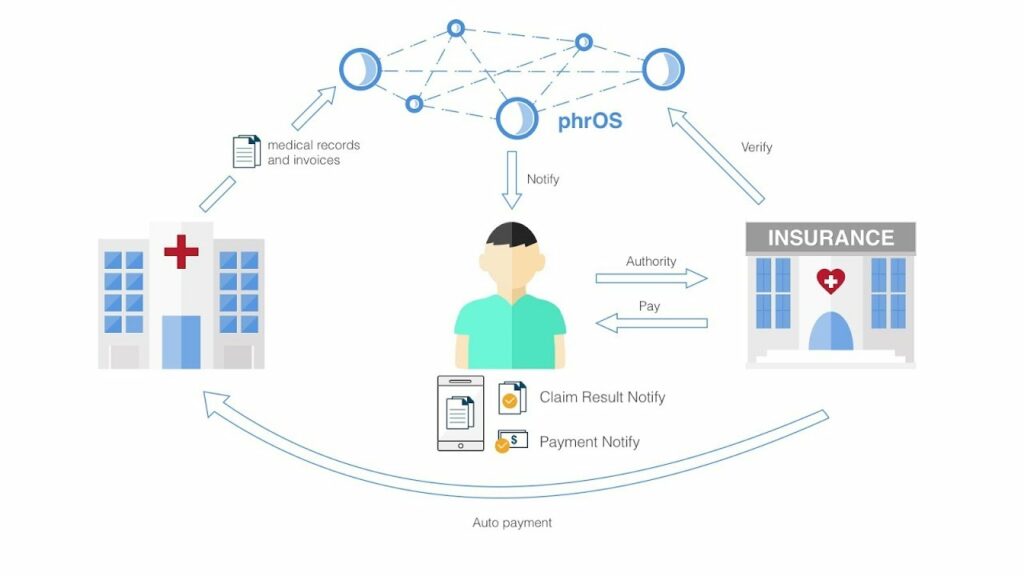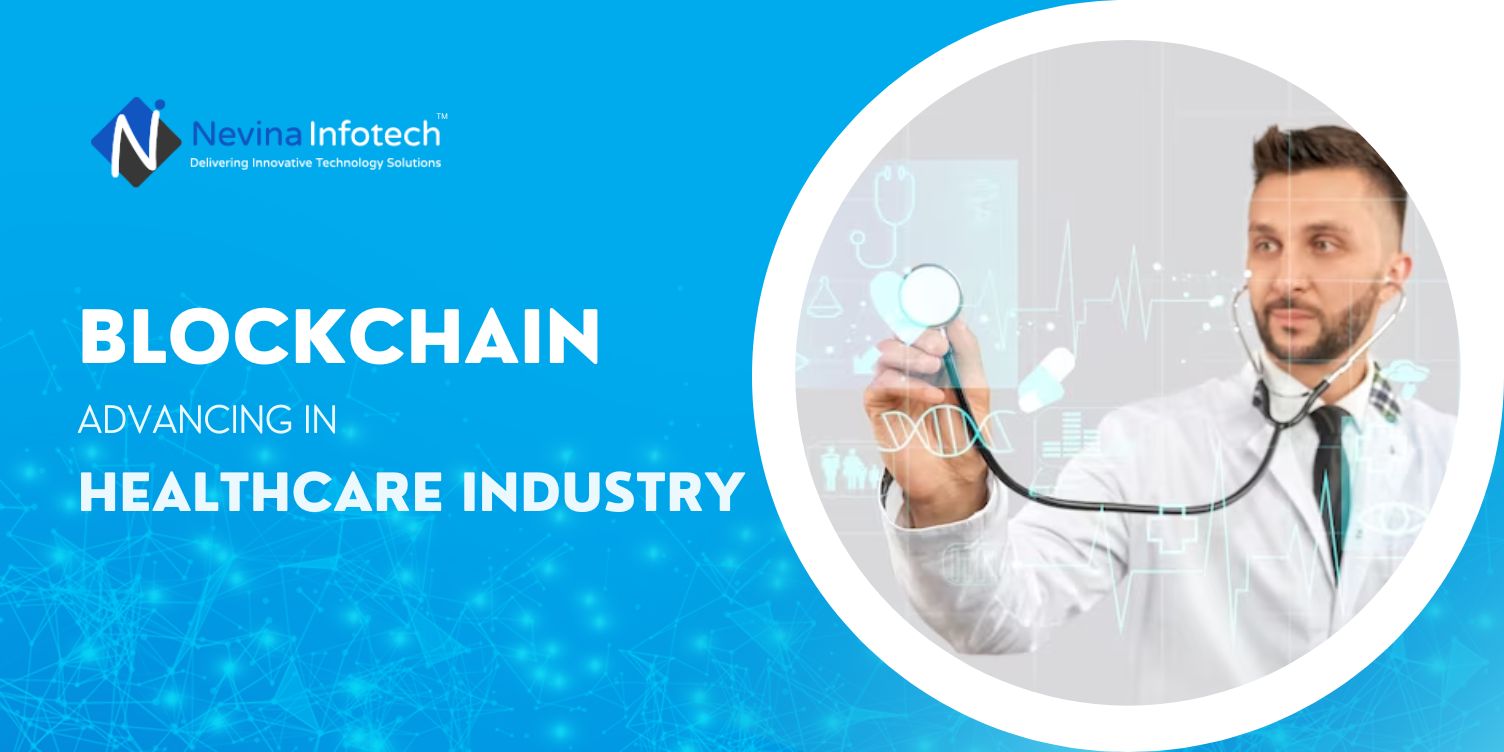The healthcare sector is constantly evolving by adopting a large number of technologies and AI for improving the treatment and data recording of patients. Technologies like IoT, blockchain, AI & ML are being used by Healthcare organizations for revolutionizing the Industry. With the modernization of this sector, we can see that it’s time to accept innovative advances in the healthcare field on an international scale. A lot of interest has been generated in the healthcare industry by the development of blockchain technology during the prior decades.
Blockchain can result in the best adoption of technology especially in situations like the Pandemic. The market for blockchain in healthcare was evaluated at USD 1.97 billion in 2022, and from 2023 to 2030, it is expected to increase at a CAGR of 68.40%.
When there was a high need for better patient care and safety this new digital solution came out to provide support to healthcare organizations. It has the ability to accelerate trials, create smart contracts, and do many other things.
Many healthcare organizations already struggle with outdated record-keeping methods, so it’s time to upgrade them using blockchain development services. With blockchain in healthcare, patients can be placed securely at the center of every process with full implementation of blockchain, which will result in completely redesigned operations with greater security, privacy, and accessibility.
In this blog, we will discuss what are blockchain in healthcare, the challenges of blockchain in health care, and its security and privacy. Which companies are leveraging the blockchain in Healthcare?
Let’s begin.
What is Blockchain in Healthcare?
Blockchain in healthcare is storing and sharing patients’ medical information securely. It allows the transfer of sensitive information only to authorized people. In healthcare systems, it provides advantages including improved data security, privacy, connectivity, and openness. Blockchain has the potential to enhance the security of data, simplify processes, save costs, and give patients more control over their health information by doing away with middlemen and allowing the secure sharing of health records.
It has the potential to transform healthcare by promoting effective and secure data interchange, supporting medical research, enhancing supply chain management, and providing reliable identification of medical staff and equipment.
Blockchain in Healthcare: Security & Privacy
Improved data security:
The use of blockchain in healthcare allows for the storage of patient data in a decentralized network as opposed to a centralized server. As a result, accessing or altering medical data is significantly more challenging for hackers. You can approach an app development company for implementing blockchain technology in your healthcare development services.
Along with security, blockchain also enables data exchange between various healthcare providers while protecting patient privacy. By establishing a transaction audit trail, blockchain has the potential to lower the prevalence of corruption and fraud in healthcare organizations.
24-hour tracking of data:
Every piece of information relating to a patient’s health, from blood pressure readings to prescriptions from the doctor, needs to be tracked and accessible around the clock. But for a variety of reasons, including connectivity challenges, data breaches, and other factors, the current healthcare infrastructure frequently is unable to offer this degree of data accessibility.
Improved Clinical trials:
Blockchain technology in healthcare has the ability to assist overcome issues with clinical trials by offering a secure and open method of managing clinical trial data. The clinical trial process would be documented on the blockchain using blockchain technology, making it simple to track data and spot problems.
Blockchain can also be used to confirm the rightfulness of medical professionals and patients, guaranteeing that only people with the proper authorization have access to clinical trial data.
Enhanced drug safety:
Clinical trials are also used for ensuring drug safety. A large amount of data is generated globally regarding adverse reactions to patients from new drugs which is difficult to manage and monitor. Drug companies are unable to track all the reactions together.
Blockchain helps drug companies in collecting, tracking, and storing of all data. Blockchain allows transparent and safe monitoring of drug safety information resulting in an increase in the safety of patients.
Smart Contracts:
Healthcare can incorporate smart contracts to automatically carry out particular tasks for contract non-fulfillment. They might be used to book appointments, check availability for advantages, and manage insurance claims automatically.
Also, smart contracts have the potential to be utilized to handle patient information and records, guaranteeing that only persons with permission can access private information.
Challenges of Blockchain in Healthcare:
Challenges from HIPAA Compliance and DATA Privacy Regulations:
The healthcare sector must follow regulations regulating data privacy and HIPAA compliance. Therefore, it is crucial to develop this technology in line with the most recent HIPAA Compliance and Regulations Acts before integrating it into medical facilities. We need to realize that the HIPAA Compliance and Regulations Acts should become flexible rather than restrictive in order to enable the usage of blockchain in healthcare.
Lack of Data Immutability:
Data immutability, or the potential for data to be stored in the ledger indefinitely, is undoubtedly a benefit of the blockchain. Since data cannot be modified after it has been created or saved, it might occasionally present a barrier to blockchain activities. It doesn’t even adhere to the necessity doctrine’s basic tenets.
Lack of Government Involvement:
Most hospitals are owned by the government. Therefore, the government is involved in putting laws into effect. Some governments are eager to implement the newest innovations. Because Blockchain is a highly decentralized, distributed ledger, government-owned hospitals cannot use it. There is no central authority or outside party making decisions. Blockchain typically makes the decisions.
Lack of Technical Knowledge:
Not every user will have advanced hardware and software resources, it is anticipated. The newest technologies are also unfamiliar to many users. Users need to be knowledgeable about modern technology. The latest technologies should be actively promoted by the media. Also, companies ought to make an effort to lower the cost of Blockchain technology and healthcare app development solutions to make them affordable.
Use cases of Blockchain in Healthcare

Patient Data Management:
Patient data management is the clearest case of a blockchain application in the healthcare industry. You’re considering secure patient data storage and enhanced availability. One can set up their account information and obtain their test results without worrying that someone is eavesdropping on their most private affairs when they want access to their results. At the same time, their doctors have easy access to such information without worrying about prying eyes.
Drug supply chain management:
So every transaction on the blockchain is recorded and immutable. As a result, using blockchain makes it simple to spot and stop the usage of fake pharmaceuticals and drug transactions. Another blockchain application is drug traceability, where inventory can be controlled and drug usage may be tracked.
By tracking the creation and processing of plasma goods, blockchain can make sure they are stored and handled properly. In addition to ensuring the items’ safety and quality, this can help avoid contamination. This can help in the prevention of fraud, forgery, and other misdeeds.
Cost For Developing An Doctor Appointment Booking App
High-security Data Encryption Standards:
There are many applications for blockchain in healthcare, but it would be difficult to come up with one that is more compelling than preventing data breaches. Blockchain data encryption is practically inaccessible to hackers. While using it now, when telemedicine applications are rapidly evolving, is very advantageous, HIPAA demands the use of secure data transmission and means of communication in the healthcare sector. Both doctors and patients are pleased with this new technology.
When we consider how blockchain can improve healthcare, it becomes clear that a strong security standard is required to prevent this sensitive data from being spread widely throughout the internet. With the help of methods like recording and encrypting data and connecting it to an open blockchain, it offers secure data transfer techniques.
Medical paperwork management:
The amount of paperwork that hospitals and other healthcare facilities’ patients and physicians must fill out can be decreased. Every time an automated system can take the place of a paper-based one, it benefits storage, lowers expenses and time spent on repetitive chores, and even avoids doctor burnout.
Additionally, insurance transactions are now simpler to track, ensuring that nothing is lost. All parties involved appreciate that neither providers nor patients must go through the inconvenience of giving more versions of transactions to insurance providers.
Integration of IoT in healthcare:
The usage of wearable Internet of Things devices with blockchain technology is now one of their most impressive features. It enables better patient and physician monitoring of health records. Blockchain can offer a simple authentication process and a safe platform for connecting data from wearables like activity, health, or fitness trackers.
Both the doctors and the patients have access to this safeguarded, often updated data, making it easier to track changes or patients’ progress. As the use of wearable technology continues to rise, blockchain healthcare app development solutions are likely to be at the top of the list.
Who is Using Blockchain in Healthcare?
Blockchain technology in healthcare has the potential to reduce the present expenditure, preserve patient data, and enhance the patient experience overall. The technology is already in use for anything from monitoring the spread of dangerous diseases to safely encrypting patient data.
The Majority of healthcare organizations are embracing blockchain in the industry. There are many blockchain companies that focus on technology that has created solutions for the healthcare industry. Some healthcare organizations are actively utilizing blockchain like Accenture, Anthem, IBM, etc.
Accenture is the corporation that developed a blockchain system with DHL that records drugs from the time of manufacture to delivery to the consumer while IBM is a top-ranked company for decades for being the best in providing Blockchain development solutions. There are many other companies like CVS Health, Anthem, and many more.
Conclusion
The key benefits of blockchain in healthcare present a special opportunity to simplify processes, facilitate interaction without mutual trust, and produce safe and unchangeable data. The adoption of related cutting-edge technologies in the network has a substantial impact on the blockchain’s future adoption in the healthcare sector.
Healthcare organizations are using blockchain for improving patient history management, tracking medication, and speeding up clinical actions with optimized maintenance of patient data. Hence, blockchain development services can significantly improve and revolutionize the way patients and medical professionals treat and use clinical records and enhance healthcare services.
You are never too late to adopt blockchain in your healthcare application. There are innovative applications in blockchain in healthcare thanks to its built-in encryption and decentralization. If you are ready to bring change to your healthcare organization and adopt new trends and patterns to create your healthcare app with blockchain technology hire a blockchain developer in India for building your application.
We can also refer to a reliable and trustworthy healthcare app development company like Nevina Infotech that are dealing with blockchain technology to scale your enterprise.
Frequently Asked Questions
How is blockchain used in healthcare?
Distributed ledger technology of blockchain makes it easier to transfer patient medical records securely, improves healthcare information security, controls the medication supply chain, and aids DNA study in the medical field.
What is the benefit of blockchain in healthcare?
With blockchain, doctors can access similar data in real time from different locations. It creates a decentralized system that makes patients’ medical records inaccessible to others and boosts medical certifications’ speed.
Which is the main problem in the Healthcare sector? Can blockchain resolve it?
The main problem in healthcare is data security. Blockchain in healthcare preserves sensitive information safely & securely. Around 600+ data breaches were disclosed by blockchain in the past years.
Read Also:



